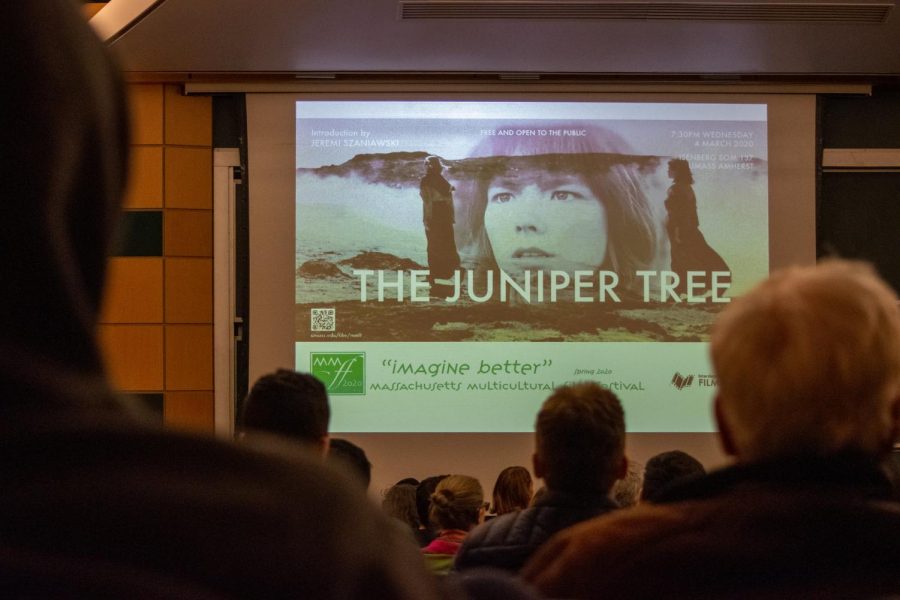The 27th annual Massachusetts Multicultural Film Festival presented a screening of “The Juniper Tree” Wednesday night in the Isenberg School of Management at the University of Massachusetts.
The 1990 black-and-white film is adapted from a Brothers Grimm tale. Set in medieval Iceland, late writer, director, editor and UMass alumni Nietzchka Keene centers her feature around the lives of two sisters who are left homeless after their mother is burned as a witch.
The night screening was presented in collaboration with the film studies’ interdepartmental program, the College of Social and Behavioral Sciences and the College of Humanities and Fine Arts, in conjunction with the University Museum of Contemporary Art’s current photography exhibit by Roni Horn, depicting photographs of Iceland and life at the Arctic Circle.
Daniel Pope, one of the curators of the MMFF and UMass film studies faculty, described this year’s festival theme.
“The theme for this year’s season is ‘Imagine Better,’ and this film is taking a Grimm’s fairytale, and updating it in a 1990 production in Iceland,” said Pope. “If you read the fairytale and then come and watch this film, you can see how a lot of the dynamics are recoded for a more contemporary audience.”
Shawn Shimpach, associate professor in communication and director of the MMFF, also spoke to the meaning behind the “Imagine Better” theme.
“We mean that in two senses,” said Shimpach. “First, ‘imagine’ better. Stretch our imagination, push beyond what we think are the boundaries and if we’re going to make a better future, we have to be able to imagine what that’s going to look like. So that’s the other part: imagine ‘better.’ What would be an improvement? What would be better? We hope to have films that challenge us in those ways. Tonight’s film is based on a fairytale and it takes place in Iceland, so it’s very much about imagination. But within that, it brings up questions about cultural roles in place of gender, of difference, of life and death.”
Shimpach hopes that viewers will take away their own meaning of the festival’s themes, as well.
“What I want everyone to come away with every week this season is thinking about what it means to imagine better, and each film I think is going to bring us to those questions and stretch us in different ways,” said Shimpach. “Tonight, is a fairytale, it’s imaginative, it’s fantastical.”
Dylan Gagnon, a senior marketing and communications double major, enjoyed the film, and drew parallels to Robert Eggers’ recent films.
“I thought it was very eerie and a lot more haunting than I thought it would be,” said Gagnon. “I enjoyed the music a lot, it reminded me of the soundtracks from the recent Robert Eggers movies ‘The Lighthouse’ and ‘The Witch.’ They’re very similar thematically, especially in terms of how they were shot, cinematography-wise.”
Pope also spoke to the significance of film festivals such as the MMFF and their presence on a college campus.
“The reasons why film festivals are so important are because they provide a venue, they provide an audience for works that are not coming out of big studios or aimed to be profitable in a multiplex,” Pope said. “But they’re still art, and cinema is art, so [film festivals] are a place for that to actually happen.”
“The festival’s idea is that it’s multicultural, international and global,” said Shimpach. “It’s bringing cultural understanding, but also different perspectives on the power, purpose and artistry of filmmaking to a campus setting, and welcome to the public and the Five Colleges. It’s this great relationship of bringing artists and filmmakers into contact with their public and with their audience, demonstrating the broad range of power and artistry that is the cinema, because of that multicultural, global ideal that we hold.”
McKenna Premus can be reached at [email protected] and followed on Twitter @mckenna_premus.




















